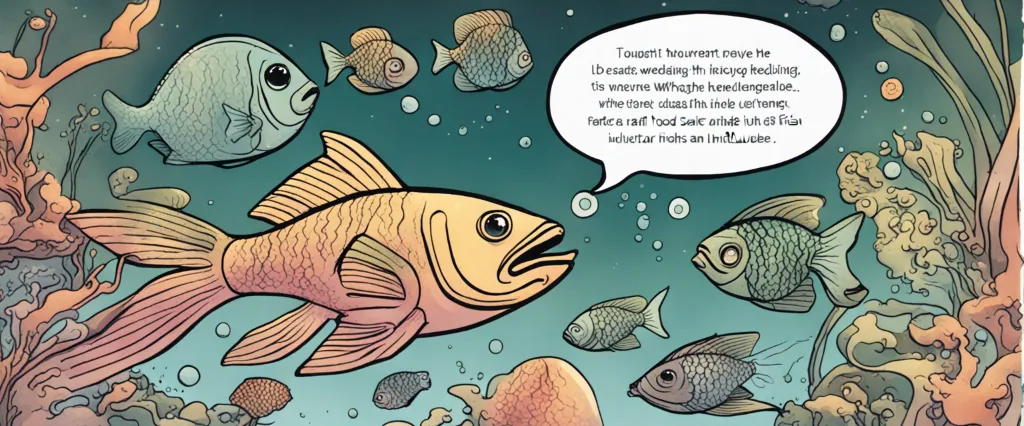
In the vast realm of books, there exists a multitude of works that delve into the intricacies of science, ushering readers on enlightening journeys through the wonders of the natural world. Amidst this vast collection, two books, “What a Fish Knows” authored by Jonathan Balcombe and “The Gene” penned by Siddhartha Mukherjee, stand out as captivating explorations, albeit in entirely different domains. Balcombe plunges into the depths of underwater existence, unraveling the mysterious lives of fish, while Mukherjee navigates the intricate landscape of genetics, charting the profound impact of genes on human life. Although seemingly divergent, these two literary masterpieces converge in their dedication to unraveling the complexities of life, offering readers a comparative study that delves into the profound similarities and intriguing divergences between the underwater marvels and the molecular blueprints that shape human existence. By examining the remarkable discoveries, scientific rigor, and distinctive storytelling techniques employed by the authors, this study aims to shed light on the hidden interconnectedness of these seemingly disparate subjects and provide a deeper understanding of the captivating world we inhabit.
Brief Summary of Two Books
What a Fish Knows by Jonathan Balcombe
What a Fish Knows” by Jonathan Balcombe is an enlightening exploration of the fascinating world of fishes and their often-overlooked intelligence, emotions, and complex behaviors. Balcombe, an ethologist, takes readers on a captivating journey through various scientific studies, anecdotal evidence, and personal experiences to challenge the traditional perception of fish as mindless and insignificant creatures.
The book covers an array of topics, including fish cognition, communication, social lives, and sense of self. Balcombe reveals the impressive cognitive abilities of fishes, such as their ability to solve problems, learn from others, and even use tools. He discusses their diverse communication methods, including visual displays, electrical signals, and acoustic communication.
Furthermore, Balcombe emphasizes the rich social lives of fishes, debunking the misconception that they are solitary creatures. From parental care to cooperative hunting strategies, he highlights the intricate social relationships formed by fish.
The author highlights the sensory world of fish, exploring their remarkable senses, such as sight, hearing, and taste. Balcombe reveals the great diversity in fish behaviors, going beyond the stereotypical image of a fish swimming back and forth in a tank. He showcases their playful and curious nature.
Through thought-provoking examples, Balcombe also tackles the controversial topic of fish emotions. He delves into studies suggesting that fishes can experience pain and fear, demonstrating that their responses to stimuli are far more intricate than previously believed.
In “What a Fish Knows,” Jonathan Balcombe succeeds in illuminating the extraordinary lives of fishes. With an engaging writing style, he challenges ingrained misconceptions and invites readers to appreciate the complex and vibrant underwater world. The book not only informs but also leaves readers with a greater understanding and respect for the often underappreciated creatures that share our planet.
The Gene by Siddhartha Mukherjee
The Gene: An Intimate History” by Siddhartha Mukherjee is a comprehensive exploration of the history, science, and impact of genetics on human life. The book delves into the story of the gene, starting from ancient Greek philosophers’ speculations to the modern era of genetic technology.
Mukherjee traces the discovery and understanding of genes, shedding light on the pioneering work of scientists like Gregor Mendel, Thomas Hunt Morgan, and Francis Crick. He explains how genes are inherited and how they influence various aspects of life, including diseases, behaviors, and traits. He explores the intricate relationship between genes and identity, touching upon topics such as genetic determinism, eugenics, and the emerging field of personalized medicine.
The book also discusses the ethical implications associated with gene editing, genetic engineering, and reproductive technologies. Mukherjee examines controversial topics such as the Human Genome Project, genetic testing, and the potential for genetic discrimination.
Through personal anecdotes, Mukherjee humanizes the scientific journey, sharing stories about his own family’s history with mental illness and his experiences as an oncologist. These narratives provide a personal connection to the subject matter and emphasize the significance of genetics in understanding and treating diseases like cancer.
“The Gene” not only provides an in-depth look at the science behind genetics but also raises important questions about the consequences and ethical considerations of manipulating our genetic code. Ultimately, the book emphasizes the tremendous impact of genes on human existence and explores the fascinating and evolving field of genetics.
Comparison between Two Books

Similarities in biology
Both “What a Fish Knows” by Jonathan Balcombe and “The Gene” by Siddhartha Mukherjee explore significant aspects of biology in their respective fields. Despite focusing on different subjects within the realm of biology, there are several notable similarities between these books.
1. In-depth exploration of genetics: Both books delve into the realm of genetics, albeit from different angles. “The Gene” provides a comprehensive history of genetics, tracing its origins and development throughout the years. On the other hand, “What a Fish Knows” examines genetic aspects related to the unique characteristics and behaviors of fish. Both books emphasize the critical role genetics plays in shaping and influencing organisms.
2. Understanding animal behavior: While “The Gene” primarily focuses on human genetics, it touches upon animal behavior as well. Siddhartha Mukherjee discusses how genes influence and shape certain behaviors, including those present in animals. Similarly, “What a Fish Knows” extensively explores the behaviors of fish, showcasing their complexity and debunking common misconceptions. Both books highlight the importance of understanding and appreciating the intricacies of animal behavior.
3. Engaging storytelling: In terms of writing style, both Jonathan Balcombe and Siddhartha Mukherjee excel at presenting complex scientific concepts in a captivating and accessible manner. They employ storytelling techniques that draw the reader in, making the scientific information more relatable and understandable. Both authors have a talent for blending scientific research with compelling narratives.
4. Interdisciplinary approach: Despite their biological focus, both books touch upon topics from multiple disciplines. “The Gene” incorporates elements of history, philosophy, and ethics, providing a broader understanding of genetics’ societal implications. Similarly, “What a Fish Knows” includes ecological, environmental, and ethical aspects surrounding fish biology. Both books demonstrate the interconnectedness of biology with various other disciplines.
5. Ethical considerations: Both authors raise important ethical questions within the context of biology. Siddhartha Mukherjee explores the ethical implications of genetic engineering and manipulation in “The Gene.” Jonathan Balcombe, in “What a Fish Knows,” addresses the ethical treatment and conservation of fish. Both books provide thought-provoking arguments about the responsibilities and ethical boundaries within the field of biology.
In summary, both “What a Fish Knows” and “The Gene” explore different aspects of biology but share similarities in their in-depth explorations of genetics, understanding of animal behavior, engaging storytelling, interdisciplinary approach, and emphasis on ethical considerations within the field of biology.
Divergences in biology
Both “What a Fish Knows” by Jonathan Balcombe and “The Gene” by Siddhartha Mukherjee delve into the field of biology, but they approach it from different angles and focus on distinct aspects of the subject matter.
“What a Fish Knows” primarily revolves around the exploration of fish behavior and their cognitive abilities. Jonathan Balcombe dives deep into the understanding of fish intelligence, emotions, social behavior, and sensory perception. The book challenges the conventional belief that fish are simple creatures and introduces evidence to support the fact that they possess complex behaviors and cognitive capacities. Balcombe’s work highlights the significance of acknowledging fish as sentient beings with their own subjective experiences.
On the other hand, “The Gene” takes a broader perspective, examining the historical, scientific, and social aspects of genetics. Siddhartha Mukherjee provides a comprehensive overview of the field, discussing the discovery of genes, advancements in genetic research, and the impact genetics has had on society and medicine. While it touches upon some aspects of biology, the divergent focus lies more on the genetic makeup and its implications in human health and heredity.
The key divergence between these two books lies in their subject matter within biology. Balcombe’s “What a Fish Knows” concentrates on a specific group of organisms, fish, and attempts to change the perception of their intellectual abilities. Conversely, Mukherjee’s “The Gene” aims to provide a broader understanding of genetics and its influence on various aspects of life, primarily focusing on human genetics. While both books explore biological concepts, they differ in their scope and emphasis.
In summary, the divergence in biology between “What a Fish Knows” and “The Gene” is that the former focuses on fish behavior and cognition, challenging existing beliefs about their intelligence, while the latter explores genetics from a historical, scientific, and socio-medical perspective, with a primary focus on human genetics.

Conclusion
Both books, “What a Fish Knows” and “The Gene,” are highly regarded for their insightful and significant contributions to their respective fields. The choice between them ultimately depends on your personal interests and what you hope to gain from reading.
“What a Fish Knows” by Jonathan Balcombe explores the fascinating world of fish cognition and their complex behavior. Balcombe provides an in-depth examination of current scientific findings, challenging preconceptions about fish intelligence and addressing ethical considerations regarding their treatment. This book is an excellent choice for those interested in animal behavior, marine biology, and ethology.
On the other hand, “The Gene” by Siddhartha Mukherjee delves into the history, impact, and future of genetics. Mukherjee, a renowned physician and researcher, offers a comprehensive exploration of genetics, covering topics such as the discovery of genes, genetic disorders, and implications of genetic research. “The Gene” is a thought-provoking read for those fascinated by genetics, medical advancements, and the ethical and societal implications surrounding the field.
Ultimately, the worthiness of either book comes down to your personal interests. If you have a greater curiosity about animal behavior and want to learn more about fish intelligence, “What a Fish Knows” may be the more engaging choice for you. However, if you are intrigued by the genetics of life and its implications for human health and society, “The Gene” will likely be a more rewarding read.


